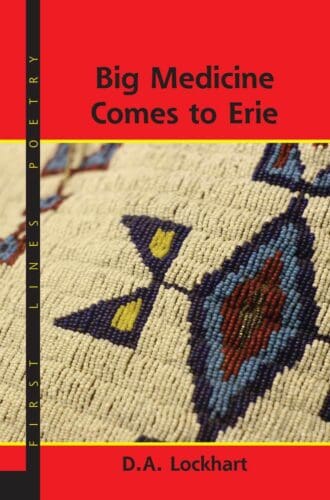REVIEW: BIG MEDICINE COMES TO ERIE | BY D.A. LOCKHART
 Black Moss Press | 84 pages | $17.00 | October 2016 | Purchase online
Black Moss Press | 84 pages | $17.00 | October 2016 | Purchase online
Review by Kim Fahner
—
D.A. Lockhart’s first collection of poems, published under the umbrella of Black Moss’s “First Lines” poetry series, evokes a sense of place and history that reflects the landscape of southwestern Ontario. References to Windsor, Detroit, and Sarnia, as well as to smaller places like Blenheim, Middlesex, and Kent County, weave themselves throughout the poems. Make no mistake: this is a collection that was thoughtfully woven and structured, with its first section titled “The Time Before” and the second one titled “The World As We Have Inherited.” The threads which weave the poetic lyrics and stories are carefully crafted poems. In his first piece, for instance, Lockhart speaks of “the curvature that lives must follow/so as to say we are not alone in our time.” There is a sense here, when reading these pieces, that Lockhart is more than mindful of how this part of the province was ‘settled,’ and how many First Nations leaders were lost or forgotten in the act of colonization and afterwards; the precise details of place names and people root his work in an origin. This sort of meticulous crafting draws you in as a reader, so that you long to learn more of the specific history.
The notion of place is continually intriguing and thought provoking. The idea of home, and of history–both personal and cultural—is something that is at the core of Big Medicine Comes to Erie. There is no mistaking where you are, as a reader of these poems: you find yourself learning about the history of the region, and then, in the second half of the book, you find yourself eavesdropping on the more contemporary rhythm of everyday life in Windsor, as when the poet writes, in “Myths of Dark Waters as Seen from Atop the Conservation Drive Overpass,” with sharp images and lines:
Beneath the skin
of this city moves a smattering of headlights,
moving like smelt through shallow dark waters.
The dance of light and shadow that permeates this particular poem is entrancing, dipping and weaving with an echo of fireworks, the beams of car headlights, and the play of light on skin. Everything here is alive. Nothing is static.
Lockhart’s images and lines are deftly crafted, so that you end up reading the pieces out loud because you don’t want to miss the inherent lyricism and music of the work. In “Through the Cicada Summer,” the poet writes of the ever-present border between Canada and America.
In full view the rough edges
of the Medicine Line
as land’s end foliage cuts
borders and is punctuated
by provincial road signs
and the scraggly ground
of unmarked roadways.
The idea that borders can define you is not always a present or all-encompassing thought if you live far away from border towns that straddle the two countries, but the notion of the searching out and discovery of personal and cultural identity is logically prominent throughout this collection. There is a questing here, a search, that ripples through the poems. Even in “Kicking up Cattails with Crazy Horse on the Queen’s Highway,” Lockhart writes beautifully of the fabric of a road trip:
The trickle of heavy picked guitar
pushes the cattails into a lean
away from traffic that could chase
off those surly blackbirds
and for a country minute
the highway is empty
and wide
and as silent
as the wind must let it be.
It’s this kind of writing that makes the reader want to drive through southwestern Ontario and discover what doorways the landscape opens in both mind and heart.
In the vibrant “The Eagles Brought their Weed from Walpole Island,” the poet writes:
We know that without land
we are no more than collections
of ceremonies borrowed
from the habits and chattel
we carry with us to the home
we construct along the way.
Again, the ideas of identity and home carry us through the collection, linking things together in an echo of memory and knowledge. Lockhart’s ability to entwine the two, the mind and the heart, is what might most draw someone to this book of poems. What you’re left with, as a reader and writer of poetry, is the hope that Lockhart will continue writing and publishing further works, exploring notions of boundaries, borders, identity, and culture, all the while capturing–most vividly—the essence of Windsor. His poems are paintings and gritty love letters to a city, too, that seems to reflect the tension that exists between two sides of the Medicine Line, and between two sides of the same coin. This stunning debut bodes well for future collections.
—
KIM FAHNER lives, writes and teaches English in Sudbury, Ontario. She has published her work in a number of Canadian poetry journals and anthologies over the last twenty years. Kim is a member of the Writers’ Union of Canada, The League of Canadian Poets, and PEN Canada. She has published three volumes of poetry, including You Must Imagine The Cold Here (Your Scrivener Press, 1997), braille on water (Penumbra Press, 2001), and The Narcoleptic Madonna (Penumbra Press, 2012).
